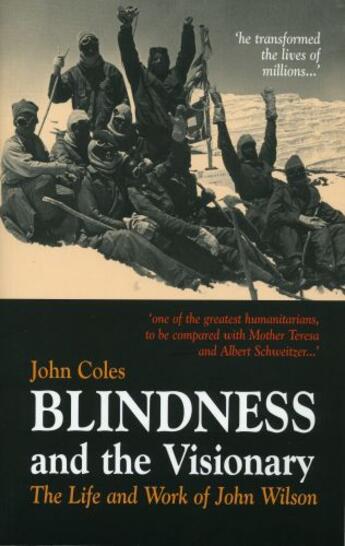Résumé:
John Wilson did more than anyone else to prevent and cure blindness, and help blind people, throughout the world between the 1940s and his death in 1999. In addition, he made a significant contribution to the cause of disabled people in general. His achievements deserve comparison with those of... Voir plus
John Wilson did more than anyone else to prevent and cure blindness, and help blind people, throughout the world between the 1940s and his death in 1999. In addition, he made a significant contribution to the cause of disabled people in general. His achievements deserve comparison with those of other charismatic figures such as Helen Keller and Albert Schweitzer. A man of action and unflagging energy, with exceptional determination, imagination and compassion, and analytical and organizational ability, he changed millions of people's lives for the better by developing systems and techniques for preventing and curing blindness, and by spurring on the process by which blind people have come to be able to play a full, active and creative role in society. His story is a moving one. Blinded himself in a school experiment in 1931 at the age of twelve, he went on to read law at Oxford. After joining the National Institute for the Blind as an administrator, he took part in 1946-7 in an epic government-sponsored tour of the African and Middle Eastern territories in what was then the British Empire that lasted nine months, studying the intractable problems of blindness there. It led to the formation of what was to become the Royal Commonwealth Society for the Blind, now known as Sight Savers International. In the wake of his sustained campaigns for the cure and prevention of blindness, above all in Africa and the Indian sub-continent, underpinned by the indomitable support of his wife Jean, John Wilson became a leading activist and mentor for blind and disabled people both at the UN and world-wide; and he was to found further important institutions such as the International Agency for the Prevention of Blindness and Impact, which focusses on the universal challenge of avoidable disability. He was an enthusiastic globe-trotter, a powerful orator, a much-loved member of his family and a highly respected friend and colleague of large numbers of people with whom he worked across the continents. This inspiring tale of how one remarkable man travelled the world and transformed countless lives will have a strong appeal to the general public. It will also be of direct interest to people involved in charities and other institutions, particularly those concerned with blindness and disability. Meticulously researched, it is primarily based on John Wilson's Braille diaries and his other papers, the records at Sight Savers and interviews in many different countries with people who knew him. Lord Colin Low, chairman, Royal National Institute of the Blind: 'I have just finished reading Blindness and the Visionary and felt I must write and tell you how enthralling I found it...[it is] an absolutely splendid addition to the literature on blindness, in every way worthy of its subject.' Ramachanda Pararajasegaram, consultant to World Health Organization, in International Agency for the Prevention of Blindness Review: '...the story, related with sensitivity and objectivity, of a unique personality destined...to become a globally renowned voice, rendering a clarion call to action, against avoidable disablement...I have had immense enjoyment reading this book, which has deepened my understanding even better of the humanity behind John Wilson. I feel re-inspired, re-enthused and re-energized to help carry out what we have collaboratively pledged to do...No reader would fail to be inspired by this book on [his] life and work, so expertly put together by John Coles...' New Beacon: 'John Wilson was once described on a Desert Island Discs interview as 'one of life's doers'. He was a towering figure on the international scene, whose inspiring leadership of the Royal Commonwealth Society for the Blind, the International Agency for the Prevention of Blindness and the Impact Foundation affected the lives of millions...This comprehensive new biography by the non-executive chairman of Sight Savers International...sheds a wealth of new light on his remarkable life.' Ba














